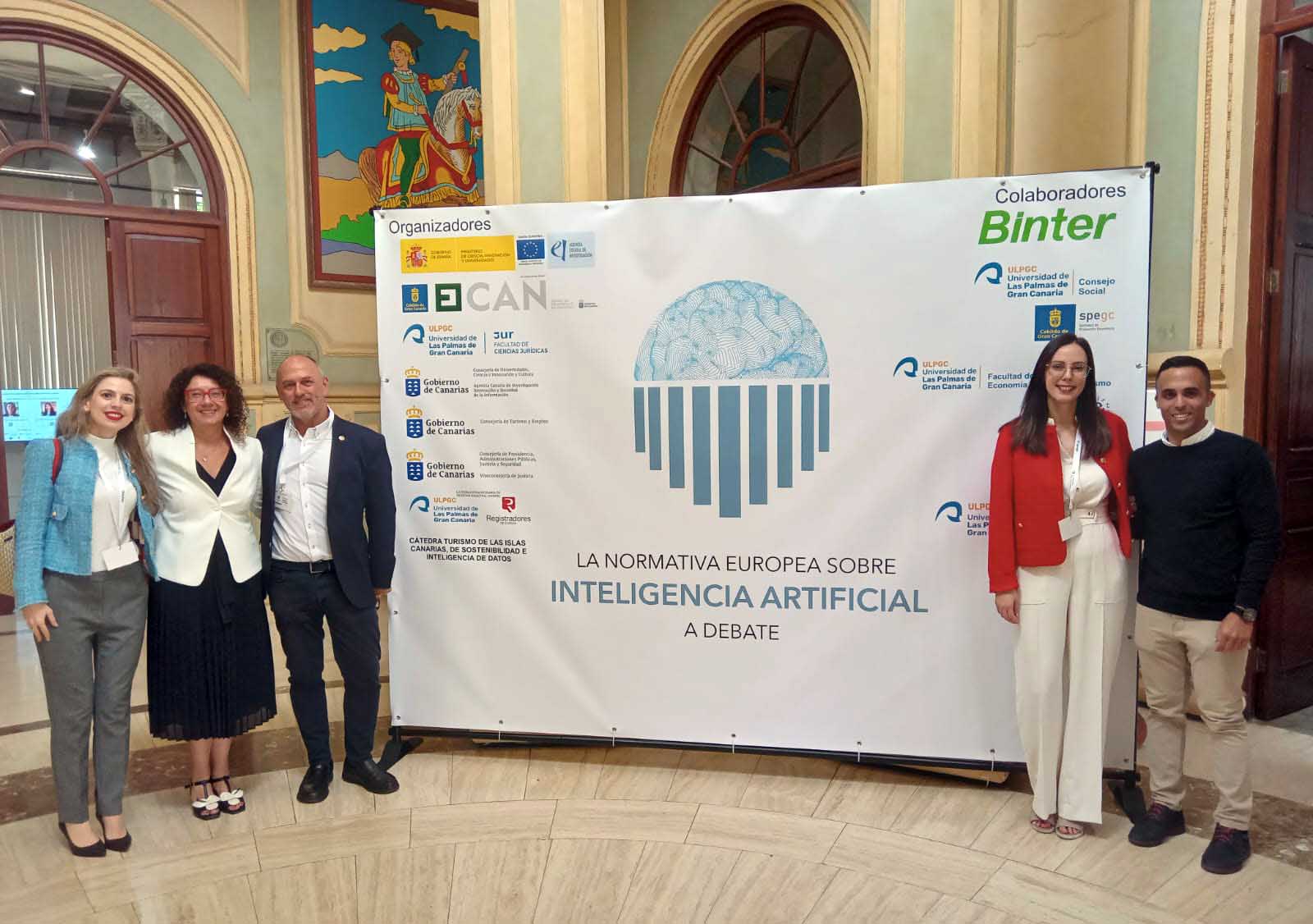The event, organised by the University of Las Palmas de Gran Canaria (ULPGC), the Ministry of Science, Innovation and Universities and the Government of the Canary Islands, took place this week in the Paraninfo of the ULPGC and brought together more than 200 people
The event has counted with researchers from this group both in the management team of the congress and in its Organising Committee, and five of the members have participated as chairpersons in 5 of the 15 sessions programmed
Six members of the Tourism, Territorial Planning and Environment (TOTMA) research group, attached to the ECOAQUA institute of the University of Las Palmas de Gran Canaria (ULPGC), participated this week, on 27 and 28 June, in the Congress 'European Regulations on Artificial Intelligence under Debate', organised by the ULPGC, the Ministry of Science, Innovation and Universities and the Government of the Canary Islands, in an event that brought together more than 200 people.
 Five of the TOTMA group members participating in the congress.
Five of the TOTMA group members participating in the congress.
The event, which took place in person in the auditorium of the academic institution in the capital of Gran Canaria, although it also took place in telematic mode, has in its management team the researchers Inmaculada González Cabrera, director of TOTMA, and Beatriz Fonticiella Hernández, a member of the group.
Both are also the chairwomen of two of the conference's round tables. Fonticiella was the one of the Inaugural Plenary Table entitled 'An Overview of Artificial Intelligence (AI) Regulations', which took place on Thursday at 10:15 a.m., while González was the one of the table 'AI Systems and Tourism Activity', which followed.
Elena Proietti, also a researcher and member of TOTMA, was a member of the Congress Organising Committee.
The researchers of the ECOAQUA group: Arturo Montesdeoca Suárez, José Luis Zamora Manzano and María José Estrada Margareto, were also chairpersons of three other round tables.
In this way, Montesdeoca was the chairman behind the round table entitled 'Artificial Intelligence Systems and the Labour Market', and Zamora did the same at round table 1 on Scientific Communications, which took place on Thursday afternoon. Estrada played the same role in the Networking Space that brought the congress to a close on Friday, after the Closing Plenary Table.
The congress included simultaneous and plenary tables, with the participation of university professors and experts from all over Spain in Artificial Intelligence, a field that has emerged in the modern world with a great transforming force, generating an impact both on the market and on the way society interacts with technology.
Around 200 people are attending this meeting, including participants and speakers from various Spanish universities, such as the ULPGC itself, the ULL, Valencia, Alicante, Jaume I, Salamanca, Vigo, Valladolid, Seville, Oviedo, Pablo Olavide, among others, and also from institutions such as the National Commission for Markets and Competition, the Spanish Data Protection Agency, the Spanish Patent and Trademark Office or the Spanish Agency for Supervision of Artificial Intelligence, as well as professionals from the legal field.
The legal system must respond to new challenges
his reality means that the legal system must respond in accordance with the new regulatory challenges. An action in which the European Union is already fully immersed and which means that this congress will serve to debate this issue, which will probably play a role that will revolutionise the world.
ECOAQUA's TOTMA group, currently made up of 11 members who teach as full or associate professors at the ULPGC, as well as having a network of external collaborators of professionals, carries out its research activity in three areas of special relevance in an island context such as that of the Canary Islands: tourism, territorial planning and the environment.
Its activity began at the end of the 1980s and since then it has participated in more than 70 research projects that have given rise to more than 300 scientific publications. In addition, TOTMA has supervised numerous master's and bachelor's degree theses and doctoral dissertations.


